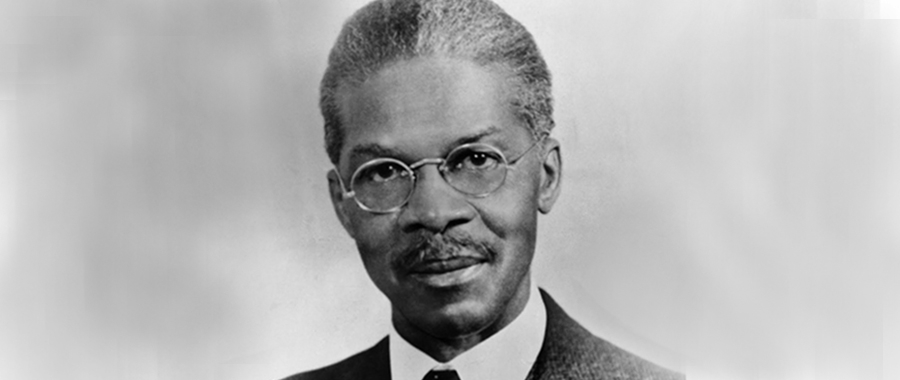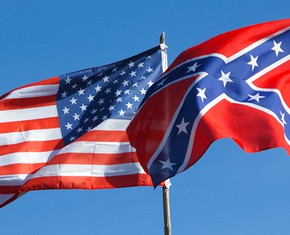The views expressed in our content reflect individual perspectives and do not represent the authoritative views of the Baha'i Faith.
The Baha’i teachings call for an end to racism, and envision the day when its ugly specter will become a thing of the past:
National rivalries, hatreds, and intrigues will cease, and racial animosity and prejudice will be replaced by racial amity, understanding and cooperation. – Shoghi Effendi, The World Order of Baha’u’llah, p. 204.
One of the first Baha’i champions of racial amity, Louis George Gregory, was born nine years after the Civil War. His mother was the daughter of an enslaved woman and her white master.
His grandmother, whose husband had been shot by the Ku Klux Klan, was a formidable woman who schooled Louis in dignity, courage and humor. When Louis was five years old, his father died of tuberculosis, leaving the family especially impoverished for a time. Later their circumstances improved when his mother married George Gregory; an African-American of some property who had been born free and who acted as a real father to Louis.
During the Reconstruction imposed on the South by the victorious North, American males of African descent could vote in elections, live in integrated neighborhoods, hold government office and receive redress for grievances from the courts. However, following the withdrawal of Union troops in 1877, the South imposed new white supremacist “Jim Crow” laws on black people as a means of social control. African Americans were denied basic human rights: the right to vote, to public accommodation, to quality education, to ownership of property, to serve on juries, to citizenship and to protection under the law.
Black people were often attacked or lynched, and their property seized in riots by whites bent on terrorizing them into submission. In the last decades of the 19th century, more than 2,500 lynchings of African-Americans occurred, mostly in the South. As violence spread over the country, membership in the Ku Klux Klan greatly expanded. Persecutions continued into the 20th century.
Louis sought higher education, and received his LL.B. degree in 1902—a rarity for an African American in those times. After being admitted to the Bar, he went into partnership in a Washington, D.C. law firm.
As a young lawyer, Louis Gregory supported the social activist ideas of W.E.B Dubois and the Niagara Movement (later the N.A.A.C.P.). The Movement stood for:
… manhood suffrage, equal civil rights, equal economic opportunity, free compulsory elementary education and access to high schools and colleges, legal and penal reform to end racial discrimination, fair treatment by both management and labor unions, and abolition of Jim Crow accommodations.
In Louis Gregory’s support for ideas considered radical at the time, he favored agitation to remove the wrongs suffered by his people. In its Declaration of Principles, the Movement aired its grievances:
We repudiate the monstrous doctrine that the oppressor should be the sole authority as to the rights of the oppressed. The Negro race in America, stolen, ravished and degraded, struggling up through difficulties and oppression, needs sympathy and receives criticism; needs help and is give hindrance, needs protection and is given mob-violence, needs justice and is given charity, needs leadership and is given cowardice and apology, needs bread and is given stone. This nation will never stand justified before God until these things
are changed.
At the Treasury Department where he later worked as an attorney in Washington, DC, Louis argued the cause of black activism with two older white colleagues. Surprisingly open-minded, these men befriended rather than offended Louis. One of those men became the cause of Louis’s guidance. Thomas H. Gibbs had attended a few Baha’i meetings where he gained a limited knowledge about its attractive ideals. He insisted that Louis attend a meeting. Louis, who could not have otherwise been diverted from his program of agitation, and who did not want to investigate religion, agreed to go.
On a cold and dismal night late in 1907, Louis went to his first Baha’i meeting, where he heard Lua Getsinger, a veteran and widely-travelled early Baha’i, recount the history of the Faith. Intrigued, Louis continued attending meetings for an 18-month period under the patient tutelage of Joseph and Pauline Hannen. “The light they unfolded was so wonderful,” Louis later wrote, “that for about a year we sat in dumb amazement, listening to their patient, loving talks, not knowing whether to advance or retreat, yet held by supernal power.” In June of 1909, Louis Gregory became a Baha’i.
In the coming years, Louis continued to advocate for racial justice. But, through the influence of the Baha’i teachings, he came to believe that the solution to America’s racial issues existed in the establishment of the Faith he now accepted—and which he began to tirelessly promote as a race amity worker. Distinguished and educated, he labored unwaveringly over the next 40 years for the cause of racial unity through a Baha’i perspective.
Dedicating his entire life to spreading the Baha’i message of racial amity, Louis traveled throughout the United States and often in the South, reaching thousands of people in schools, colleges, churches, forums, and conferences. Reflecting his passion for racial harmony, he wrote in one of his many articles:
The two races little understand each other. Apprehensions, imaginations, prejudices, resentments, fears, hatreds destroy confidence in each other’s good intentions and create a wall of separation which is generally thought impassable.
After violent racial hostilities broke out in Washington DC, he appealed:
The danger of the situation is extremely grave. This city which is a nation’s pride has already been disgraced by rioting and lawlessness on the part of mobs, during which shots were fired even within a block of the White House, and scenes of like are continually threatened. The feelings of many people are bitter and intense. Wherever in the world today there is hatred of class for class, nation for nation, race for race, tragedy lurks. Its outbreak may be delayed, but unless sentiments are changed it cannot be prevented.
Louis wholly embraced the Baha’i principles concerning racial prejudice:
To discriminate against any race, on the ground of its being socially backward, politically immature, and numerically in a minority, is a flagrant violation of the spirit that animates the Faith of Baha’u’llah. The consciousness of any division or cleavage in its ranks is alien to its very purpose, principles, and ideals. Once its members have fully recognized the claim of its Author, and, by (accepting) unreservedly the principles and laws embodied in its teachings, every differentiation of class, creed, or color must automatically be obliterated, and never be allowed, under any pretext, and however great the pressure of events or of public opinion, to reassert itself. – Shoghi Effendi, The Advent of Divine Justice, p. 29.
When Louis Gregory passed from this world in 1951, Shoghi Effendi sent a telegram that recalled his true worth:
Profoundly deplore grievous loss dearly beloved, noble-minded, golden-hearted Louis Gregory, pride example Negro adherents Faith, keenly feel loss one so loved, admired trusted … African continent will glory his memory.
















Comments
Sign in or create an account
Continue with Googleor